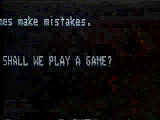
The beginning of the 80's brought the first massified wave of personal computer consumption. In 1979 Visicalc makes the sales of Apple II computers skyrocket and pulls its price down. In 1980, Sinclair Research releases ZX80, the first computer priced under $150. Also in 1980 comes Space Invaders for the (oh, good days!) Atari 2600.
Youngs were among the first ones to adopt computers and videogames as tools. There began the stereotype of the "young genius", the wizard that steals the job from older persons and whose talent with anything digital is endless. The dark side of this is that all those who learned to load games from tape recorders today notice that really few things once learned are useful today.
With the computer's enfants terribles, the power of the once mysterious machine gained a face. And it was the face of the son (or daughter) who rode bits and bytes without fear or mistakes. And, as for the common public all computers are the same, use an 8-bit computer in one's home is the same thing as crack a NORAD defense system. Add to that the big fear of the cold war days and you have one of the great computer films: WarGames, from 1983.
In "War Games", a young well-intentioned hacker connects a computer of the US government capable of launching nuclear missiles. The kid plays "Global Thermonuclear War" with the machine, who considers really launhcing the missiles. To the computer, game and reality are the same (and that's true).
Note: computers have lost much of their old intelligence and charm while characters. The hacker's home equipment has no trace of personality. It is nothing but a tool. Joshua (the missile launcher) has a boring synthesized voice and doesn't pay attention to human details. There's a fundamental difference between HAL and Joshua : while the first knew human limitations and discarded them as inferior, the latest simply doesn't pay attention because its software can't do so.
Joshua's creator, a computer scientist, is also the first creator to regret its creation. He moans about the lack of humbleness of his son-computer.
Computer bad guys reached a ridiculously visionary climax in TRON (1982). The film foresaw many of the stuff we hear about virtual reality today, including the integration between user and interface, BUT the concept of a "master control" commanding every software to play games to his delight is something way too allegoric. Can you imagine a deathmatch between a spreadsheet and a database? Well, TRON scriptwriters DID.
The user is scanned into the computer in TRON
In spite of the weak screenplay, TRON is a landmark. To its production were developed polygonal rendering softwares and hardware was pushed ahead of its time. The art direction is fantastic and inspired works all over the world.
Losing stoplessly its magic in the movies as the sales of more powerful personal computers grew (and as the young hackers ALSO grew), the computers entered the 1990's as personal productivity tools, very much like the real thing.


 Roberto Tietzmann - RTIETZ@CESUP.UFRGS.BR
Roberto Tietzmann - RTIETZ@CESUP.UFRGS.BR
 Welcome page |
LEAD Home
Welcome page |
LEAD Home